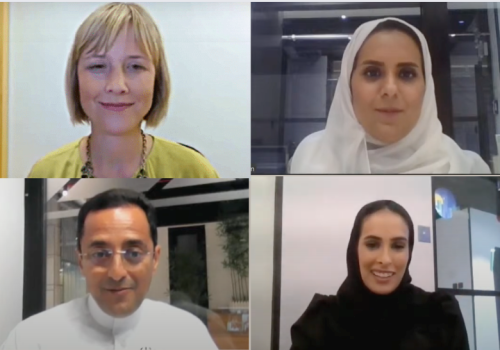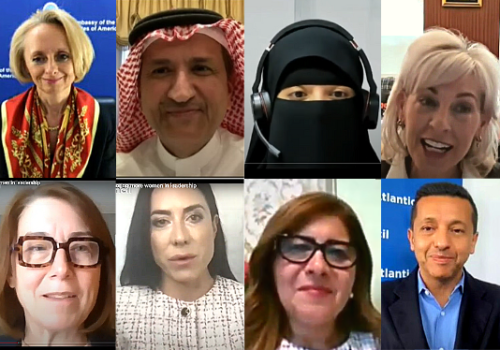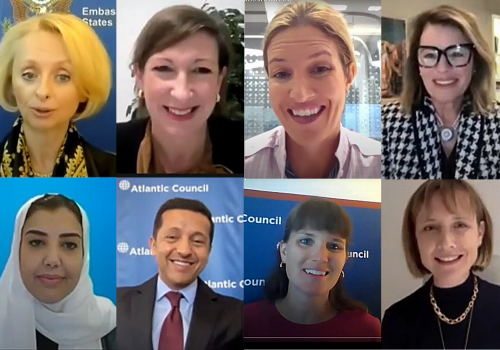Redefining the meaning of ‘failure’ in policies and culture to promote business risk
On January 24th, the Atlantic Council’s empowerME Initiative held a discussion about destigmatizing failure and promoting business risk through policies and culture. The event was moderated by Jamila El-Dajani, the Co-Chair of the American Chamber of Commerce Saudi Arabia’s Women in Business Committee and featured The Local Agency Saudi Arabia Co-Founder and Managing Director Dalal Al Mutlaq, BizWorld.org UAE, Jordan, Saudi Arabia, and Egypt CEO Helen Al Uzaizi, Entail Solutions Managing Partner Kelly Blackaby, International Finance Corporation Regional Vice President Hela Cheikhrouhou, and Visa Chief Financial Officer for MENA Thereshini Peter.
This was the fourth in a series of four events for the first cohort of the WIn (Women Innovators) Fellowship[SA1] launched in Saudi Arabia led by the Atlantic Council’s empowerME Initiative in cooperation with Georgetown University’s McDonough School of Business with support from US Embassy Riyadh, PepsiCo, and UPS. The American Chamber of Commerce Saudi Arabia’s Women in Business Committee is the program’s in-person event partner. The yearlong program, which is taking place from March 2022 – March 2023, enables more than thirty Saudi women entrepreneurs to enhance their networks, gain practical knowledge, and develop US-Saudi people-to-people and business ties that will help them scale their business locally, regionally, and globally.
The key points from the discussion are summarized below.
Learning how to accept failure as part of the learning process:
- Dalal Almutlaq reflected on the times she has failed and how to move forward from them, saying: “if you just reflect and learn from those mistakes, that’s how you grow. That pain you get from failure is what helps you become more resilient, it teaches you to surpass difficult times. It’s always difficult times that teach us and helps us how to grow. I don’t like the word failure…it’s just lessons learned.”
- Helen Al Uzaizi talked about learning to accept that failure will be a constant: “I think the minute we recognize that life happens and things happen that are beyond our control, absolutely [we need] accountability, but [we need to] recognize that life happens. Sometimes it might just be that life happened, not necessarily a failure…once you’ve failed as many times as I have, and many of us have, you start to realize that it’s all just part of life and the process.”
How to find the balance between taking bold risks and being reckless:
- Hela Cheikhrouhou explained how to mitigate risk: “You don’t take reckless risk as such, but you have to be willing to lose for the greater impact that you’re hoping to achieve and of course, it has to be relatively well structured to increase the chance of success, because with success comes impact. However, if it is a failure like others today have said in an inspiring manner; we learn from those lessons.”
- Thereshini Peter talked about how sharing the responsibility of risk-taking makes it less intimidating: “The biggest part – depending on how big or small the risk is – the environment is different in how you tackle that. If there is a large risk and high reward, the level of assessment goes very deep. I think the big part in a larger organization is that the shared responsibility meets certain areas. But also, there is deep accountability to make sure that we grow and learn from that.”
- Al Uzaizi spoke on the importance of risk when pursuing an entrepreneurial path: “One of the key entrepreneurial mindset characteristics is risk-taking. And I think without being a risk-taker you really cannot be an entrepreneur. You can be someone that has a side hustle, and that’s a wonderful thing. But really entrepreneurship is about risk-taking.”
The kind of culture that incentivizes teams to be more creative and risk-taking:
- Almutlaq described her passion for creating a work culture that promotes risk:“You can make a mistake as long as you’re held accountable for it, if you know how to come ask for help if you need help. That safe environment for the team is what is core for pushing creativity because you need that safety net for creativity.”
- Kelly Blackaby noted that mangers should focus on inspiring their team through several key points: “I think in terms of focusing on that team, it really is about the freedom to be creative…your flexibility [offering hybrid or remote schedules]…and your reward policy; making sure that people are really motivated to keep trying.”
Steps that can encourage women to take risks while having an entrepreneurial mindset:
- Blackaby stressed the importance that mentors can have on your career: “I think a lot of women do suffer from imposter syndrome and sometimes it’s really hard to believe in yourself, but I think if you can access that encouragement either from peers, managers, or from outside organizations, [they] can really support you to believe that you can do this.”
- Cheikhrouhou stated that a key way to encourage more women to have an entrepreneurial spirit is to accept failure as an option: “I come from a conservative family; you’re supposed to be perfect…mistakes are not well tolerated, and that’s the opposite of entrepreneurial behavior…yes you do your best but sometimes [the timing and market] are wrong”.
The most important advice to give to an aspiring entrepreneur:
- Almutlaq spoke about how not taking the first step of starting is a failure in itself: “We were taught that an ‘F’ is wrong and ‘you cannot fail in university or at your job’…you’ll never know if you’re failing or not unless you take that first step.”
- Al Uzaizi talked about the importance of teaching youth to reframe their mindsets about traditional work culture: “We don’t teach [children] failure, and we don’t teach them how to fail because you cannot. But what we do is reflect: what worked, what didn’t and what risk did you take? When you do that, you’re automatically reflecting and building that resilience to failure and risk.”
How attitudes towards entrepreneurs have shifted in recent years:
- Al Uzaizi reflects on how differently society views entrepreneurship since she started her company in 2016: “Last week I got an email from the Ministry of Education in the UAE about entrepreneurship innovation and that went out to all schools and we concluded a program with the Ministry of Economy, which was entrepreneurship. This was never the case a few years ago. This is a testament to how much people believe in the development of these skills because it is the future.”
The importance of anti-fragility in the workplace:
- Blackaby spoke about the importance of adapting the mindset of anti-fragility: “The concept of anti-fragility is to think about how you grow and flex with stress…it’s a concern because organizations that cannot adapt to that are going to swept by organizations that can…having flexible policies and procedures in place that help you to adapt.”
How large organizations can promote effective risk taking and learning from their mistakes:
- Peter speaks from her personal experience working at multiple large organizations: “It is extremely important [for large companies] to be able to covet and to allow themselves to actually change and take risk…the difference with large corporations and the change that they are doing, is that they do see that they need to stop being so bureaucratic and start being more flexible.”
Amira Attia is a Program Assistant with the Atlantic Council’s empowerME Initiative at the Rafik Hariri Center for the Middle East.
Further reading
Mon, Oct 3, 2022
New laws in Saudi Arabia support women in business, and society is catching up quickly
Event Recap By
On September 28, the Atlantic Council’s empowerME initiative held a discussion on regulations and laws that impact women in business in Saudi Arabia.
Tue, Jun 14, 2022
Promoting more women in leadership is “a business imperative” and key to unlocking economic prosperity, say top executives
Event Recap By Allison Holle
On June 7, the Atlantic Council’s empowerME Initiative held a workshop on "Balance of power: Promoting more women in leadership."
Mon, Nov 8, 2021
Top women execs on leading “deliberate” organizational change, fostering diversity and inclusion, and coping with challenges
Event Recap By Stefanie Hausheer Ali
On November 2, the Atlantic Council’s empowerME Initiative held a workshop on “Women in senior management: Masterclass in leadership.”


